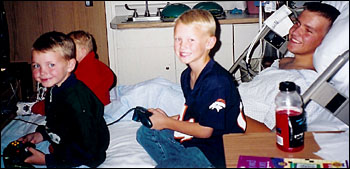Caring for Your Other Children
As your children grow and your family changes, consider
the following tips:
- Devote quality time to each of your children; if possible, schedule some alone time on a regular basis.
- Consider the feelings a child may have toward her sibling with special needs, which may include guilt, embarrassment, resentment, or grief. Acknowledge these feelings—even the negative ones—and help your child understand and work through them.
- Use appropriate and straightforward language when communicating with a typically-developing child about a sibling with special needs. It helps them to know proper terms and meanings.
- Many times, our other children want to help with their siblings with special needs, which shows how much they care. Find small ways to let your other children be involved in caring for their sibling with special needs, but make sure you do not ask too much of them. Maintain balanced, healthy expectations about siblings serving as caregivers.
Make Special Time for Siblings
Taking just a little bit of time out of each day to devote attention to your other children helps them to feel special, too. Take time to watch a movie, read a story, scratch a back, or simply ask about your child’s day, activities, and interests. No matter how busy you are, it is important to show your children that you are as involved their lives as you are in the life of their sibling with special needs. Of course, we realize that this sounds far simpler than it actually is; if there are days when you don’t have one extra minute, give yourself a break.
Sibling Feelings
Talking About the Diagnosis
- Talk with your children about their brother’s or sister's diagnosis, including the behaviors and symptoms that are part of the diagnosis.
- Encourage their questions and listen to their concerns.
- As you learn more about your child’s diagnosis, teach your other children about it, too, and reassure them that they can share the information with others when they feel ready.
- Help them understand that their sibling’s diagnosis is nothing to feel ashamed about.
- Let them know that it’s no one’s fault.
- Let them know that their feelings are important. Seek sibling support groups or "sibshops" in your area to help your children connect with other kids who have siblings with disabilities. Sibshops help kids accept and understand disability and consider it "no big deal."
Working through Feelings
Inviting Friends into the Home
Acknowledging Feelings
Managing Feelings
Safe Places to Talk
Language: Choosing the Right Words
Parents often have a difficult time explaining to their other children, especially when a child is very young, what is different about their child with special needs. As a parent, you may try to explain a developmental disorder, terminal illness, disability, or disease, but your child may not fully understand the information. There is no easy solution, but it is important to listen carefully to your child’s questions, and then use simple, accurate language to explain the health issue. This will help them to gain a basic understanding of their sibling’s needs, and allow them to be more comfortable to talk about her sibling’s health or disability in all situations. Below, we offer a few examples that may be helpful when you have to answer your children’s questions. We’re sure that children will come up with many more questions than we can anticipate; you may have to just wing it, but try to stay positive, and speak as simply as possible.
Finances
Family Outings
Siblings as Caregivers
Younger Siblings Helping

Older Siblings Becoming Responsible
Resources
Information & Support
For Parents and Patients
Brothers and Sisters ( 139 KB)
139 KB)
This handout from TelAbility.org provides tips for providers and parents to help them special needs siblings.
Sibling Support Project
A national effort dedicated to the life-long concerns of brothers and sisters of people who have special health, developmental,
or mental health concerns, includes Sibshops workshops for siblings.
Sibling Support on Facebook
Facebook page for the Sibling Support Project.
Sibshops: workshops for siblings of children with special needs
A program of the Sibling Support Project.
Spread the Word Inclusion
A campaign toward creating more accepting attitudes, using people-first language and inclusion for all people with intellectual
and developmental disabilities.
Services for Patients & Families in Rhode Island (RI)
| Service Categories | # of providers* in: | RI | NW | Other states (3) (show) | | NM | NV | UT |
|---|---|---|---|---|---|---|---|---|
| Family Support Services | 45 | 13 | 23 | 66 | 31 | |||
| Local Support Groups, Disability/Diag | 19 | 5 | 19 | 40 | 94 | |||
| National Support Services, Disab/Diag | 116 | 116 | 116 | 116 | 117 | |||
For services not listed above, browse our Services categories or search our database.
* number of provider listings may vary by how states categorize services, whether providers are listed by organization or individual, how services are organized in the state, and other factors; Nationwide (NW) providers are generally limited to web-based services, provider locator services, and organizations that serve children from across the nation.
Authors & Reviewers
| Authors: | Lynne M. Kerr, MD, PhD |
| Chuck Norlin, MD | |
| Reviewer: | Tina Persels |
| 2014: update: Gina Pola-MoneyA; Tina PerselsA |
| 2010: update: Rachel M. HansonA |
| 2008: first version: Alfred N. Romeo, RN, PhDR |


 Get Help in Rhode Island
Get Help in Rhode Island
